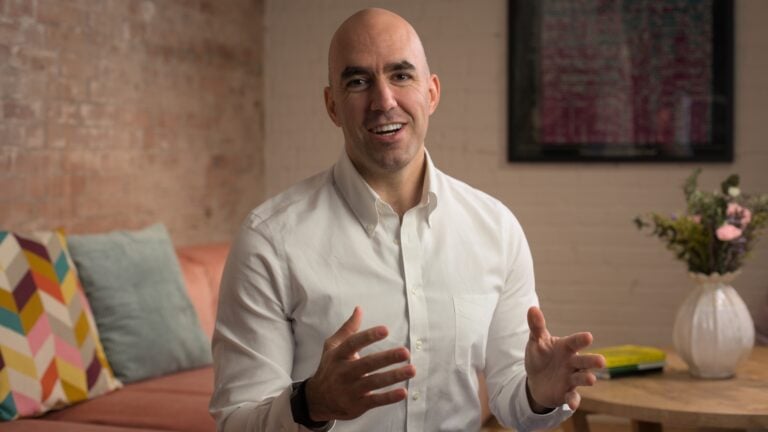Season 5: Innovating for impact
The tools to empower your team onwards

Creating an innovative and inclusive culture within an organisation requires a strategic approach that empowers your team through training or employee resource groups (ERGs) – these are employee-led groups formed around shared characteristics or life experiences. This can be a good way for the top layers of the team to hear what is needed to ensure employees can thrive and meet their goals. Empowering individuals to suggest cultural improvements has been a driver of progress in some of the most innovative and successful companies across the world.
By fostering an environment where every individual feels valued, supported and equipped with the necessary skills, leaders can unleash the full potential of their team. Let’s explore some simple steps that will help you to empower your employees and cultivate innovation and inclusivity within the workplace:
Define your values and goals to shape a consistent culture across teams
It’s essential to establish a strong foundation for inclusion and innovation by defining the organisation’s values and goals. These values should be communicated clearly and consistently to all employees, emphasising the importance of diversity, collaboration and creativity. Even if you don’t have an official communications executive or team, leaders can incorporate the values into their company announcements and updates. You can also display the company values in shared spaces like the kitchen. By aligning everyone around a shared vision, organisations can create a sense of purpose that motivates employees to contribute their best ideas and efforts.
TRY THIS:
Does your company already have a shared vision? Do you know where to find it? If not, can you or a team leader write one and display it somewhere the whole team can see it?
Invest in training programs aligned with your values, goals and strategy
Whether you’re a team of ten or a hundred, you can really create positive impact in your company culture by investing in training programs that provide employees with the skills and knowledge they need to thrive in a diverse and dynamic environment. Ideally training will cover a wide range of topics, including unconscious bias, communication skills, negotiation training and creative problem-solving – with employees or ERGs making suggestions too. By equipping employees with these essential skills, organisations can foster a culture of learning and open-mindedness.
TRY THIS:
Does your company already offer training programs like this? If not, why not begin by asking the people in your team which ones they would most like to do, perhaps using the suggestions above as a starting point. Then find out where the nearest course is offered and when it will next run.
Create specialised employee resource groups
It’s becoming increasingly popular to create employee-led resource groups that focus on specific aspects of diversity and inclusion. Individuals with a shared affinity from historically marginalised groups can create a safe and brave space to discuss workplace issues and generate new ideas and solutions. These groups, usually composed of volunteers from across the organisation, can serve as valuable forums for sharing experiences, exchanging ideas and driving positive change. Whether it’s a women’s leadership network, an LGBTQ+ alliance, or a disability advocacy group, these resource groups can play a crucial role in amplifying diverse voices and perspectives within the organisation. Traditionally these groups are found in larger organisations, but this doesn’t need to be the case. Your first employee resource group may only be made up of 2 or 3 people!
Offer accessible ways to upskill and continue employees’ learning and development
Business leaders should actively encourage employees to participate in continuous learning and development opportunities. There’s never been a better time to create an innovative culture where employees have explicit permission to be proactive and suggest ways they would like to learn. This could involve providing access to online courses, workshops, conferences, or even sponsoring further education, especially if there are qualifications that might benefit the wider team. By investing in employees’ growth and development, you can demonstrate your commitment to fostering a culture of innovation and inclusivity, while also equipping individuals with the skills they need to succeed in their roles.
TRY THIS:
As a first port of call, canvas opinion amongst your team and get a sense of who would like to take advantage of any learning and development opportunities offered. And if so, what they might be?
Create a culture of informal learning and peer-to-peer knowledge sharing
Consider setting up a weekly or monthly event where employees gathers to hear a mini-lecture or talk to promote informal learning and knowledge-sharing initiatives. You can also experiment with initiatives like mentorship programs, organising cross-functional projects, or hosting brainstorming sessions, even hackathons. By creating opportunities for employees to collaborate, experiment, and learn from each other, organisations can tap into the collective intelligence of their workforce and drive innovation from the ground up.
Celebrate diversity in all its forms
Show your team how much diversity and inclusion matters to you and form a foundation in your business. You can do this by highlighting the achievements and contributions of employees from different backgrounds, cultures and perspectives. You can also mark important cultural events in the team calendar to raise awareness, for example, managers might want to be aware of religious holidays across all faiths. By showcasing diversity as a source of strength and competitive advantage, organisations can inspire others to embrace inclusivity and foster a culture where everyone feels valued and respected.
In conclusion, empowering employees through training and resource groups is essential in creating an innovative and inclusive culture within organisations. Whatever maturity stage your business is at, by investing in comprehensive training programs, fostering employee resource groups, promoting continuous learning and development, encouraging informal knowledge-sharing initiatives and celebrating diversity, teams can unleash their full potential and drive innovation and success in today’s rapidly changing business landscape.
As we come to the end of this Member Masterclass on building a culture for innovation, I really hope you give some of these ideas a try in your own business. With a commitment to leveraging innovation for inclusivity, you can unlock the full potential of your team and create a future where diversity is not just celebrated but embraced as a source of strength and competitive advantage. Good luck!


